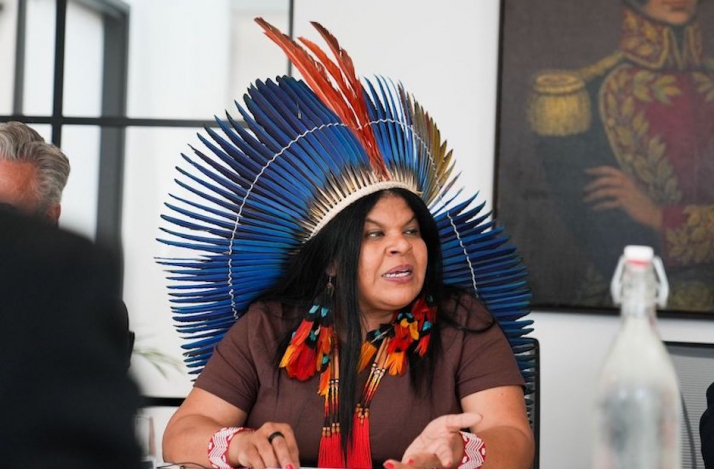The Future is Indigenous

NbSI Fellow Aline Soterroni was invited to attend a roundtable with Sonia Guajajara, Brazil’s Minister of Indigenous Peoples, organised by the Canning House and Brazil’s Embassy in the UK. Two young indigenous activists, Txai Suruí and Thiago Guarani, also participated in the event.
After four years of environmental setbacks, violence, and neglect, Indigenous Peoples are working with the Brazilian government on the country’s reconstruction. The establishment of the first-ever Ministry of Indigenous Peoples, led by Sônia Guajajara, a Brazilian indigenous leader, activist and environmentalist, is a significant sign by the new government. Additionally, for the first time in 55 years, FUNAI (National Foundation of Indigenous Peoples) has an indigenous woman president, Joenia Wapichana.
Brazil, the most megadiverse country on earth, hosting 60% of the Amazon and 15-20% of the world’s biological diversity is also home to 305 indigenous groups present in all Brazilian biomes and states. During the event, Sônia shared the work she has been leading during the first eight months of 2023, with a particular focus on the resumption of indigenous lands demarcation, the fight against illegal mining in the Yanomami reserve, the development of policies to support indigenous peoples’ rights, and the need to align climate and biodiversity agendas.
The demarcation of indigenous lands is essential to securing their rights, preserving their identity, reducing conflicts over land ownership, curbing deforestation and protecting biodiversity. Brazil’s Supreme Court has recently blocked an agribusiness effort to create restrictions to Indigenous land claims, the so-called “marco temporal”. However, on the same day Sônia was speaking at the Canning House roundtable, Brazil’s Senate passed a bill overturning the Supreme Court’s decision. The text goes now to President Lula for approval or veto.
“We, indigenous peoples, make up 5% of the world’s population and protect 82% of the world’s biodiversity” – Sônia Guajajara
According to the State of the World’s Indigenous People Report, despite living in areas that harbour roughly 80% of the world’s biodiversity, many Indigenous people grapple with the preservation of their legal rights to lands, territories and resources. Recent studies have highlighted that deforestation rates, which contribute to biodiversity loss and carbon emissions, are significantly lower within indigenous territories compared to outside (Sze et al., 2021; Silva-Junior et al., 2023). Sônia emphasised the long-standing resilience of Indigenous Peoples and their important contributions to global efforts to address climate change and biodiversity loss.
It is essential that we learn from Indigenous leaders, especially indigenous women, about advocating for environmental and human rights and adopting sustainable practices in a rapidly changing world. The evidence suggests that their knowledge is valuable in understanding how to work with nature, as part of nature, particularly in a warming world. Therefore, it is not only a moral imperative to support their rights and land protection but also a practical one. To achieve this, we should move beyond tokenism and be led by Indigenous Peoples in key decision-making processes, working collaboratively to ensure their rights are upheld.
“The Ministry of Indigenous Peoples was created at a very opportune and much-needed moment for the world, to understand the leadership and role of indigenous peoples and territories. Not only for the fight against climate change but as a humanitarian and civilizational agenda for the entire world, for the entire planet. We also make ourselves available to all individuals and governments to help them understand, to comprehend that the future is ancestral, that the future is indigenous.”- Sônia Guajajara
Access Sônia full speech at the Canning House here.




